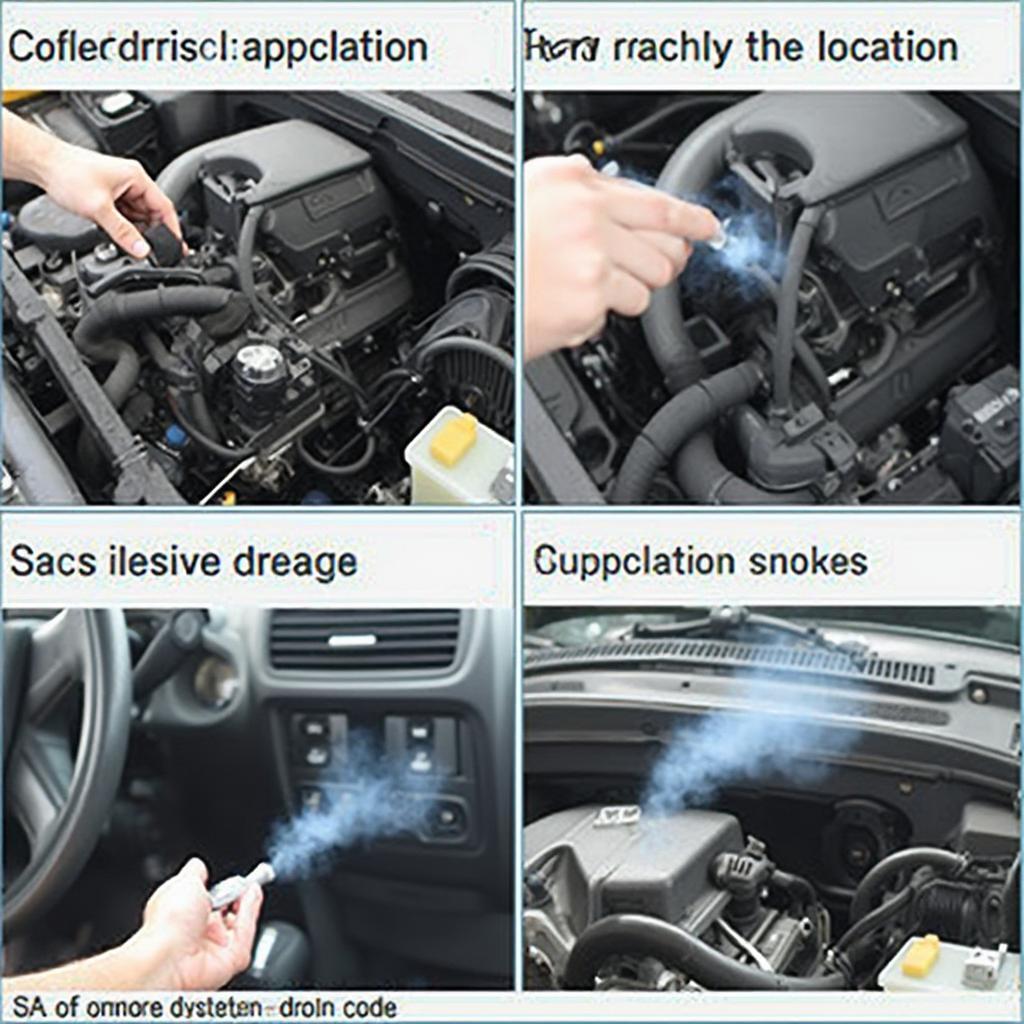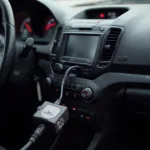The dreaded check engine light illuminates your dashboard, and your OBD2 scanner reveals the cryptic codes P0455 and P0456. What do these codes mean, and what should you do? This comprehensive guide will demystify the P0455 p0456 obd2 code combination, providing you with the knowledge to diagnose and address the underlying issue.
A P0455 code signifies a large evaporative emission system leak detected, while a P0456 code indicates a small leak. These codes point towards a problem in the system designed to prevent fuel vapors from escaping into the atmosphere. While seemingly minor, these leaks can impact fuel efficiency and contribute to environmental pollution. Understanding these codes is crucial for maintaining your vehicle’s health and minimizing its environmental impact. Let’s explore these codes in detail, starting with the common causes.
Common Causes of P0455 and P0456
Several factors can trigger P0455 and P0456 codes. These range from minor issues like a loose gas cap to more complex problems requiring professional attention.
Loose or Damaged Gas Cap
One of the most frequent culprits is a loose, damaged, or missing gas cap. The gas cap seals the fuel tank, preventing vapor escape. A faulty gas cap disrupts this seal, triggering the OBD2 codes. Always ensure your gas cap is securely tightened after refueling.
Faulty Evaporative Emission Control System Components
Beyond the gas cap, various components within the evaporative emission control system can malfunction. These include the purge valve, vent valve, and charcoal canister. These components regulate the flow of fuel vapors and require specialized diagnostic tools to pinpoint the faulty part.
Cracked or Damaged Fuel Tank
In less common cases, a cracked or damaged fuel tank can lead to significant vapor leaks, triggering a P0455 code. This requires immediate attention due to the potential fire hazard.
Leaking Fuel Lines or Hoses
Damaged or deteriorated fuel lines and hoses can also contribute to evaporative emissions leaks. Inspecting these components for cracks, holes, or loose connections is essential for accurate diagnosis.
Diagnosing P0455 and P0456
Diagnosing the specific cause of these OBD2 codes often involves a systematic approach. You can learn more about emissions leak best obd2 practices on our dedicated page.
Visual Inspection
Start with a thorough visual inspection of the gas cap, fuel lines, and hoses. Look for any obvious signs of damage or loose connections. Tighten the gas cap if necessary and clear the codes to see if they return.
Using an OBD2 Scanner
An obd2 scanner p0456 is essential for retrieving and interpreting the specific codes. This tool provides more detailed information about the nature of the leak and can help narrow down the potential causes. Check if you can use an OBD2 scanner for P0456 on our website.
Smoke Test
A smoke test involves injecting smoke into the evaporative emission system to pinpoint the location of the leak. This is a highly effective method for detecting even the smallest leaks.
Pressure Test
A pressure test checks the integrity of the entire system by pressurizing it and monitoring for pressure drops. This can help identify leaks that might not be visible during a visual inspection. More details on GM OBD2 code 455 can be found on our specialized page.
Fixing P0455 and P0456
The solution depends on the specific cause of the leak. Replacing a faulty gas cap is a simple fix, while repairing a damaged fuel tank requires professional intervention. For more insights into Joying OBD2 codes, visit our dedicated resource. If your vehicle is a GM model, check our gm obd2 code 455 page.
Replacing the Gas Cap
If the gas cap is the culprit, replacing it is a cost-effective and easy solution. Ensure the new cap is compatible with your vehicle model.
Repairing or Replacing Damaged Components
Damaged fuel lines, hoses, or other components within the evaporative emission system will need to be repaired or replaced. This may involve specialized tools and expertise.
Addressing Fuel Tank Issues
Cracked or damaged fuel tanks pose a serious safety risk and require immediate professional attention.
Conclusion
Addressing P0455 p0456 obd2 code is vital for maintaining your vehicle’s performance, fuel efficiency, and environmental responsibility. Understanding the potential causes and employing appropriate diagnostic techniques will help you resolve the issue quickly and efficiently. Ignoring these codes can lead to more serious problems down the road, so take action as soon as you encounter them.
Frequently Asked Questions (FAQ)
- What does the P0455 code mean? A P0455 code indicates a large leak in the evaporative emission control system.
- What does the P0456 code mean? A P0456 code indicates a small leak in the evaporative emission control system.
- Can I drive with a P0455 or P0456 code? While you can usually drive with these codes, it’s best to address them promptly to prevent further damage and ensure your vehicle is running efficiently. Find out more on our page discussing can obd2 p0456.
- How much does it cost to fix a P0455 or P0456 code? The cost varies depending on the underlying cause, ranging from a few dollars for a new gas cap to several hundred dollars for more complex repairs.
- How can I prevent these codes from recurring? Regularly inspect your gas cap, fuel lines, and hoses for damage and ensure your gas cap is tightly secured after refueling.
- What is an evaporative emission system? The evaporative emission system prevents fuel vapors from escaping into the atmosphere.
- What is an OBD2 scanner? An OBD2 scanner is a diagnostic tool used to retrieve and interpret trouble codes from your vehicle’s computer.
Need help with P0455 and P0456 codes? Contact us via WhatsApp: +1(641)206-8880, Email: [email protected] or visit us at 789 Elm Street, San Francisco, CA 94102, USA. Our 24/7 customer support team is ready to assist you.


